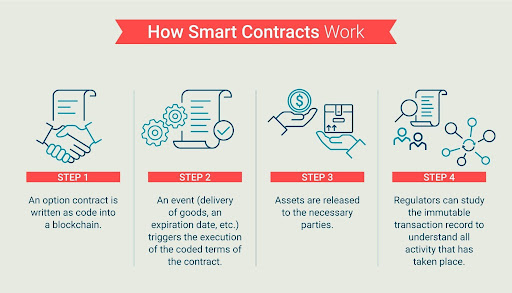The smart contract audit process can seem complicated and overwhelming to those who do not work in the field. But with a few tips, it becomes much easier to understand. You might have questions like what smart contracts are, why they need auditing, and who conducts smart contract audits. In this blog post, we will answer all of these questions and more!
What Are Smart Contracts?
Smart contracts are digital protocols or sets of instructions that facilitate, verify or enforce the negotiation/performance of a contract. Smart contracts have been used to automate payment for goods and services since 1993. However, they were not popularized until Ethereum smart contracts became available in 2015. In addition, smart contract code is run by decentralized nodes on blockchain shared ledgers with consensus mechanisms. This way, they guarantee high availability without any censorship, downtime, or interference from third parties.
Why Are Smart Contracts Needed?
Since smart contracts enable business rules to be automated across multiple organizations and users, they can increase efficiency within an industry. They also provide transparency between businesses working together. However, this also means that bugs in smart contract code may lead to significant financial loss if left unchecked. It is for this reason that smart contracts must be externally audited before they are put into use.
What Is A Smart Contract Audit?
A smart contract audit is an in-depth look at smart contracts code to find bugs, security flaws, and areas of improvement. This process can be done manually or with automated software tools. You have to conduct smart contract audits before the release of a smart contract. Otherwise, there may be a significant financial loss if issues arise after they have been put into use on the blockchain.
Why Is A Smart Contract Audit Conducted?
A smart contract audit is conducted to find bugs, security flaws, and areas of improvement in smart contracts. Smart contracts are vulnerable because smart contract code is executed as part of a deal between two parties. Failure to work properly could result in significant financial loss for the companies transacting business through smart contracts.
Who All Should Implement A Smart Contract Audit?
Smart contract audits should be implemented by all executives, developers, users, and investors. This will help ensure that the organizations do not suffer any losses due to bugs within smart contact code after they have been put onto the blockchain network. It’s worth noting though, only skilled auditors can conduct this type of audit. This is because it requires software engineering skill sets, programming knowledge, and technical experience.
What Are Some Smart Contract Vulnerabilities?
Reentrancy Attacks
The most common smart contract vulnerability is reentrancy. It occurs when a smart contract enters an already executing function without returning back to the calling function. This allows cyber-attackers to drain funds from wallets by making repeated requests for more money than exists in wallet accounts.
Front-Running Attacks
Another smart contract vulnerability is front-running. It occurs when a miner can access information faster than other miners and use that information to their own advantage. The attacker would then place orders in the blockchain ahead of others’ orders. They do this to achieve higher profits or cost savings. This attack will help attackers buy items at lower prices before anyone else has had an opportunity to do so.
Unchecked Send Functionality
Unchecked send functionality allows smart contracts to make withdrawals from wallets beyond what was originally deposited into them. In fact, they do this without any block confirmation check for double-spending attacks or insufficient funds issues. When smart contracts are coded with this function, it increases the potential for loss through sending too much money during transactions. Unfortunately, there’s no way for smart contracts to verify that the amount being sent is correct.
Race Conditions
A smart contract race condition happens when two smart contracts execute code at the same time. They rely on the output of both transactions to determine which transaction is accepted. If this occurs, one smart contract may accept a transaction that should not be processed while another rejects it.
What Are The Benefits Of Smart Contract Auditing?
There are many benefits of smart contract auditing before putting smart contracts into production. This includes:
- Saving money by reducing or eliminating potential bugs that can cause financial loss if left unchecked
- By bringing in outside experts who understand how these types of applications work you will be able to make your blockchain application more efficient which means it will cost less (in time and/or money).
- Smoother running business thanks to automated processes. These digital protocols enable businesses to streamline their operations while also increasing transparency between companies.
Conclusion
With the increasing popularity of cryptocurrencies, it is no surprise that this form of currency has quickly become one of the most lucrative investments. If you’re still wondering what a smart contract and a smart contract audit are, don’t worry! We’ve explained the basics in this blog post.

